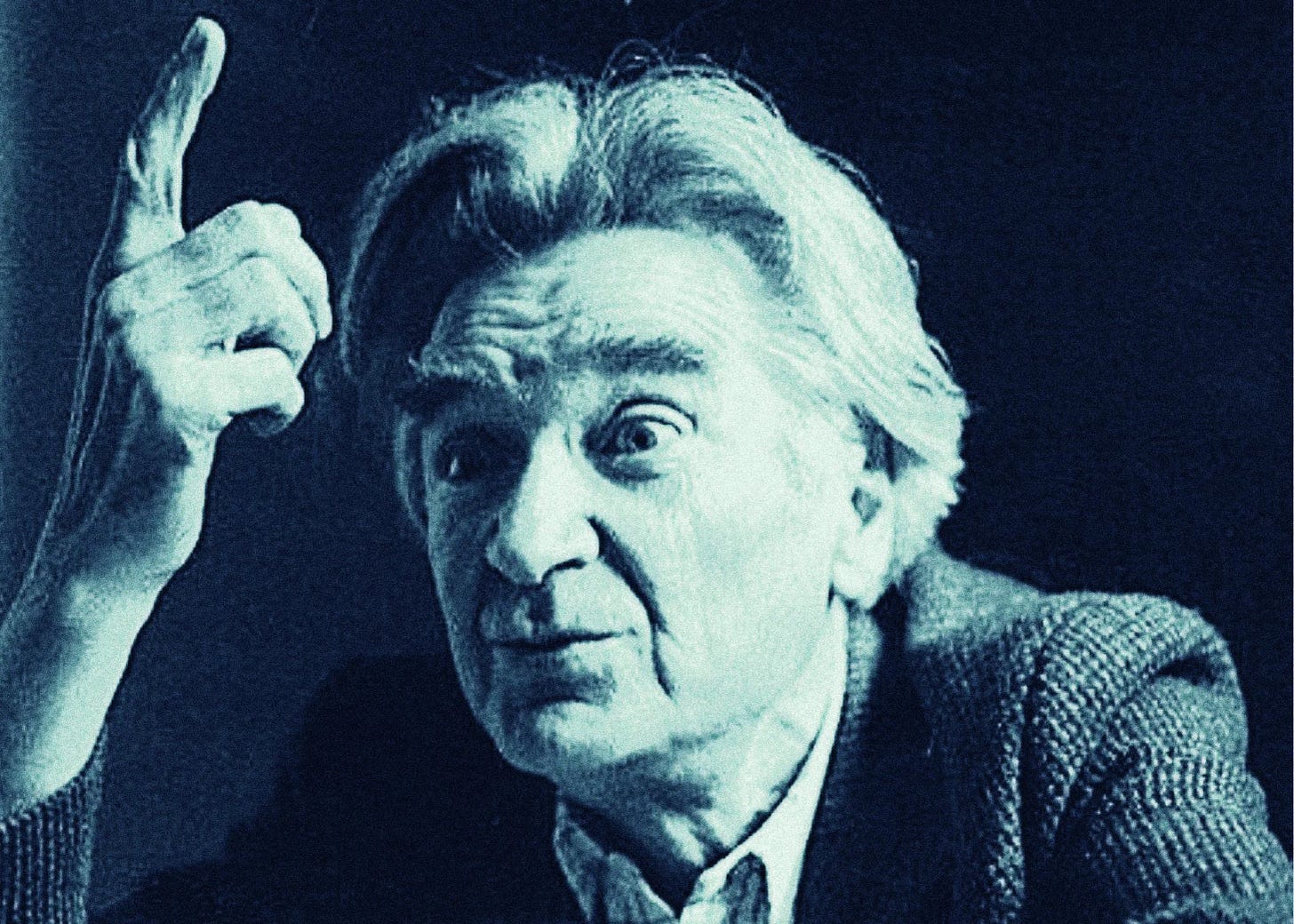The Poisoned Chalice
Why Cioran’s Embrace of Nothingness is the Only Antidote to Modern Despair?
In an age saturated with relentless positivity and the hollow pursuit of manufactured meaning, the work of Emil Cioran arrives like a bracing, ice-cold shock to the system. The Romanian philosopher offers not a comforting balm but a potent poison—a philosophy steeped in despair, absurdity, and the futility of existence. Yet, paradoxically, it is within this bleak abyss that Cioran locates the only authentic form of freedom available to us: a liberation found not by overcoming despair, but by surrendering to it completely.
A Philosophy Born of Futility
“The Trouble With Being Born” is a philosophical exploration of existential themes by Romanian philosopher Emil Cioran, whose work contemplates the inherent absurdity and futility of human existence. Published in 1973, the book encapsulates Cioran’s characteristic blend of sardonic humor and deep philosophical inquiry, inviting readers to confront the existential despair that accompanies consciousness. Cioran’s reflections challenge the conventional pursuit of meaning, positing that true freedom can be attained through the acceptance of life’s inherent contradictions and absurdities.
Cioran, a prominent figure in existentialist thought, draws upon influences from philosophers such as Nietzsche and Kierkegaard to articulate a vision of existence marked by suffering, alienation, and ultimately, liberation. His writing is laced with a poetic sensibility, utilizing aphorisms that expose uncomfortable truths about life, death, and the human condition. Through his works, he critiques societal norms and traditional values, arguing that liberation lies in embracing despair rather than seeking refuge in false hopes.
The book is notable for its exploration of existential themes such as isolation, the search for meaning, and the interplay between humor and suffering. Cioran’s philosophy often conveys a deep pessimism, suggesting that human experiences are inextricably linked to pain and nothingness. Yet, rather than leading to despair, this recognition can offer a form of freedom—an authenticity born from acknowledging the absurdity of existence.
Despite Cioran’s relatively low profile compared to his contemporaries, his works have garnered a dedicated following and have influenced contemporary thought, highlighting the complex relationship between suffering and self-awareness. His literary legacy continues to resonate with readers seeking to navigate the existential dilemmas of modern life, illustrating the paradoxical notion that freedom may indeed arise from the acceptance of despair.
The Architect of Anguish
Emil Cioran (1911–1995) was a Romanian-born philosopher and essayist known for his works that delve into themes of despair, existence, and the human condition. His writings often reflect a deep existential angst and a critique of the human experience, making him a prominent figure in existentialist thought. Cioran’s philosophical outlook emphasizes the futility of existence and the burden of consciousness, resonating with the despairing yet insightful perspectives of thinkers like Nietzsche and Kierkegaard.
Cioran’s literary style is marked by a poetic sensibility, employing aphorisms and a fragmented narrative that invites readers to confront uncomfortable truths about life and mortality. His early writings, influenced by his experiences in Romania and the turmoil of World War II, reveal a profound disillusionment with existence, which he famously described as a “sickness” that afflicts humanity. The existential dilemmas he presents compel readers to confront their own anxieties and uncertainties about existence, and he articulates a vision of personal freedom that arises from embracing despair rather than fleeing from it.
Despite his relatively low profile compared to contemporaneous philosophers, Cioran garnered a dedicated following in both Europe and the United States. His popularity in the latter was notably bolstered by influential figures such as Susan Sontag, who praised his work and positioned him within the anti-systematic tradition of philosophical thought alongside notable figures like Kierkegaard and Nietzsche. Cioran’s legacy continues to influence contemporary existential and post-structuralist philosophy, highlighting the complexity of human experience and the intrinsic link between suffering and self-awareness.
Anatomy of a Bleak Vision
Cioran’s Philosophical Approach
E.M. Cioran’s work, particularly in “The Trouble With Being Born,” embodies a sardonic philosophy that grapples with the inherent despair of existence. Cioran posits that the experience of being human is fraught with existential angst and futility, which he articulates with both humor and melancholy. His reflections challenge the conventional pursuit of meaning, suggesting instead that acceptance of life’s absurdities can lead to a form of freedom. Cioran asserts that embracing despair allows individuals to confront the triviality of existence without the burden of false hopes or expectations.
Existential Themes
Cioran’s writing is steeped in existential themes that echo the thoughts of philosophers such as Sartre and Nietzsche. He explores the notion that “existence precedes essence,” arguing that individuals are thrown into a world devoid of inherent meaning, and thus must navigate their existence amid the chaos. This resonates with existentialist views on freedom and responsibility, as Cioran emphasizes that the acknowledgment of life’s absurdity can liberate one from societal norms and expectations. His critique of traditional values serves as a stark reminder of the limitations imposed by cultural constructs, aligning with the existential belief in the necessity of authentic self-creation.
Humor and Cruelty
Cioran’s philosophical satire is often characterized by a blend of humor and cruelty, challenging the reader to confront uncomfortable truths. The interplay of humor in his work serves as a coping mechanism, allowing individuals to engage with despair in a manner that is both reflective and liberating. This duality mirrors discussions within the philosophy of humor, where the relationship between cruelty and humor is explored extensively. Cioran’s sardonic wit invites readers to reconsider the nature of suffering and the human condition, suggesting that humor can emerge from the darkest corners of existence.
The Path to Freedom
Ultimately, Cioran’s exploration of despair is not merely a lamentation of the human condition but rather a pathway to freedom. By confronting the inherent meaninglessness of life, individuals can liberate themselves from the constraints of expectation and societal pressures. This existential freedom, however, is not without its challenges, as Cioran acknowledges the weight of existential choice and the responsibilities it entails. The recognition of




